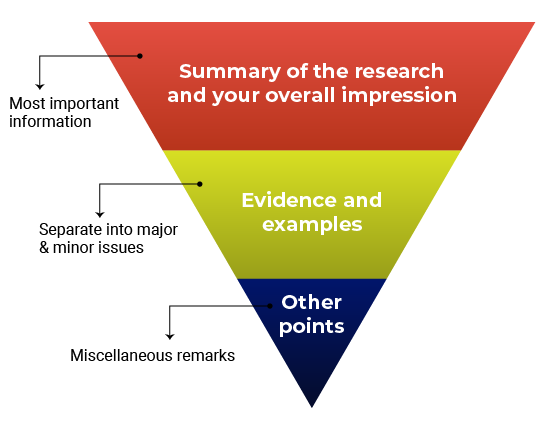Sample Essay 1 Peer Review Response & Grading Expectations

When yous write a peer review for a manuscript, what should you include in your comments? What should you leave out? And how should the review exist formatted?
This guide provides quick tips for writing and organizing your reviewer report.
Review Outline
Employ an outline for your reviewer study so it's easy for the editors and author to follow. This will likewise help y'all continue your comments organized.
Think about structuring your review like an inverted pyramid. Put the most important information at the top, followed past details and examples in the center, and any boosted points at the very bottom.

Here's how your outline might look:
1. Summary of the research and your overall impression
In your own words, summarize what the manuscript claims to written report. This shows the editor how you interpreted the manuscript and will highlight any major differences in perspective between you and the other reviewers. Give an overview of the manuscript's strengths and weaknesses. Call up well-nigh this as your "take-home" message for the editors. End this section with your recommended course of action.
two. Discussion of specific areas for improvement
Information technology's helpful to divide this section into ii parts: i for major bug and one for small-scale issues. Inside each department, you can talk virtually the biggest issues outset or go systematically effigy-by-figure or claim-by-merits. Number each detail then that your points are easy to follow (this will also make it easier for the authors to respond to each point). Refer to specific lines, pages, sections, or figure and table numbers so the authors (and editors) know exactly what you're talking about.
Major vs. small issues
What's the difference between a major and minor issue? Major issues should consist of the essential points the authors need to accost before the manuscript can proceed. Make sure you focus on what isfundamental for the electric current study. In other words, it'southward not helpful to recommend boosted piece of work that would be considered the "next step" in the study. Minor problems are however important but typically will not affect the overall conclusions of the manuscript. Here are some examples of what would might go in the "small-scale" category:
- Missing references (but depending on what is missing, this could also be a major outcome)
- Technical clarifications (e.g., the authors should analyze how a reagent works)
- Data presentation (due east.g., the authors should nowadays p-values differently)
- Typos, spelling, grammar, and phrasing issues
3. Any other points
Confidential comments for the editors
Some journals have a space for reviewers to enter confidential comments about the manuscript. Employ this infinite to mention concerns nigh the submission that you'd want the editors to consider before sharing your feedback with the authors, such as concerns almost ethical guidelines or language quality. Any serious bug should be raised directly and immediately with the journal as well.
This section is also where you lot volition disclose any potentially competing interests, and mention whether you're willing to await at a revised version of the manuscript.
Exercise not use this space to critique the manuscript, since comments entered here will not be passed along to the authors. If you're not certain what should go in the confidential comments, read the reviewer instructions or cheque with the journal starting time before submitting your review. If you are reviewing for a periodical that does non offer a space for confidential comments, consider writing to the editorial function direct with your concerns.
Get this outline in a template
Giving Feedback
Giving feedback is hard. Giving effective feedback tin can exist fifty-fifty more challenging. Call up that your ultimate goal is to talk over what the authors would demand to do in lodge to authorize for publication. The point is not to nitpick every slice of the manuscript. Your focus should be on providing constructive and critical feedback that the authors tin use to improve their study.
If you've e'er had your ain work reviewed, you already know that it's not e'er easy to receive feedback. Follow the gold dominion: Write the type of review you lot'd want to receive if you were the author. Even if you decide non to place yourself in the review, y'all should write comments that you would be comfortable signing your proper name to.
In your comments, use phrases like "the authors' discussion of Ten" instead of "your discussion of Ten." This will depersonalize the feedback and go on the focus on the manuscript instead of the authors.
General guidelines for effective feedback

Practise
- Justify your recommendation with concrete evidence and specific examples.
- Be specific so the authors know what they need to practice to improve.
- Be thorough. This might be the only time you read the manuscript.
- Exist professional and respectful. The authors will be reading these comments too.
- Remember to say what you liked about the manuscript!

Don't
- Recommend boosted experiments or unnecessary elements that are out of scope for the study or for the periodical criteria.
- Tell the authors exactly how to revise their manuscript—you don't need to practise their work for them.
- Use the review to promote your own research or hypotheses.
- Focus on typos and grammar. If the manuscript needs pregnant editing for language and writing quality, just mention this in your comments.
- Submit your review without proofreading it and checking everything 1 more time.
Earlier and After: Sample Reviewer Comments
Keeping in heed the guidelines above, how do you put your thoughts into words? Here are some sample "before" and "afterward" reviewer comments
✗ Before
"The authors announced to have no idea what they are talking nigh. I don't recollect they have read any of the literature on this topic."
✓ Later
"The report fails to accost how the findings relate to previous research in this surface area. The authors should rewrite their Introduction and Discussion to reference the related literature, especially recently published piece of work such as Darwin et al."
✗ Before
"The writing is so bad, it is practically unreadable. I could barely bring myself to finish information technology."
✓ Afterward
"While the report appears to be sound, the language is unclear, making it difficult to follow. I advise the authors piece of work with a writing charabanc or copyeditor to amend the flow and readability of the text."
✗ Before
"Information technology'southward obvious that this blazon of experiment should have been included. I accept no idea why the authors didn't utilise information technology. This is a big mistake."
✓ After
"The authors are off to a good get-go, however, this study requires boosted experiments, peculiarly [type of experiment]. Alternatively, the authors should include more information that clarifies and justifies their choice of methods."
Suggested Language for Tricky Situations
Y'all might notice yourself in a situation where you're not sure how to explain the trouble or provide feedback in a constructive and respectful way. Here is some suggested language for common bug y'all might experience.
What you think: The manuscript is fatally flawed.
What yous could say: "The study does not appear to be sound" or "the authors have missed something crucial".
What you lot think: You don't completely understand the manuscript.
What yous could say: "The authors should clarify the following sections to avoid confusion…"
What yous think: The technical details don't make sense.
What you could say: "The technical details should exist expanded and clarified to ensure that readers sympathise exactly what the researchers studied."
What you call up: The writing is terrible.
What you could say: "The authors should revise the language to improve readability."
What you lot think: The authors accept over-interpreted the findings.
What you could say: "The authors aim to demonstrate [XYZ], however, the data does not fully support this conclusion. Specifically…"
What does a skillful review look like?
Cheque out the peer review examples at F1000 Inquiry to see how other reviewers write upwards their reports and requite constructive feedback to authors.
Time to Submit the Review!
Exist certain you turn in your report on fourth dimension. Need an extension? Tell the periodical so that they know what to await. If you need a lot of extra fourth dimension, the journal might need to contact other reviewers or notify the author about the delay.
Tip: Building a relationship with an editor
You'll be more likely to be asked to review over again if you provide high-quality feedback and if you turn in the review on time. Especially if it's your first review for a periodical, information technology's important to show that yous are reliable. Prove yourself in one case and y'all'll go asked to review again!
Related Resources
-
How To How to Cull the Journal That'due south Correct for Your Study
There'south a lot to consider when deciding where to submit your work. Acquire how to choose a journal that will help your study achieve its audience, while reflecting your values as a researcher…
Read more than
-
How To How to Write Discussions and Conclusions
The discussion section contains the results and outcomes of a written report. An effective give-and-take informs readers what tin can be learned from your…
Read more
-
How To How to Report Statistics
Ensure appropriateness and rigor, avoid flexibility and above all never manipulate results In many fields, a statistical analysis forms the heart of…
Read more
cardillomigniver91.blogspot.com
Source: https://plos.org/resource/how-to-write-a-peer-review/
0 Response to "Sample Essay 1 Peer Review Response & Grading Expectations"
Enviar um comentário